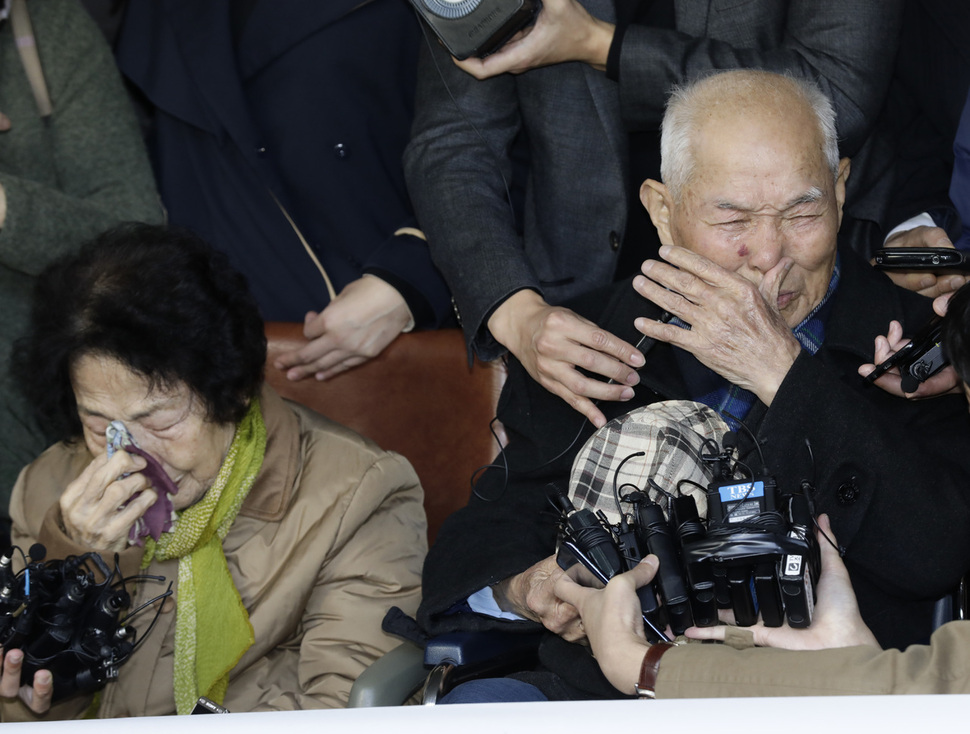 |
|
Lee Choon-sik, 94, is the last remaining survivor of a group of plaintiffs that filed suit against the Japanese company responsible for their forced mobilization and labor during the colonial occupation. Lee is seen shedding tears at the South Korean Supreme Court in Seoul on Oct. 30 after the court’s ruling that Nippon Steel & Sumitomo Metal Corporation should pay reparations to the victims. (Kim Myoung-jin, staff photographer)
|
Issue raised by attorneys defending Nippon Steel in case of forced laborers asking for damages
The Supreme Court recently produced its first-ever final ruling ordering a Japanese business to pay damages to victims of forced labor, but a debate is now raging over whether future suits will have the same outcome. While the court did state that right to claim damages did not expire with South Korea and Japan’s signing of a Claims Settlement Agreement in 1965, it did not include a clear decision on its extinctive prescription. The extinctive prescription issue was raised by one of the attorneys representing the defendant, Nippon Steel & Sumitomo Metal Corporation (formerly Nippon Steel), in a Nov. 8 hearing of another case at Seoul Central District Court’s second civil affairs division (under judge Kim Hang-seong) involving forced mobilization victims demanding damages. The defense asked the court to “set arguments at a later date, as there has not yet been a Supreme Court decision on the extinctive prescription.” Lower-court trials in the forced labor cases have been resuming since the Supreme Court issued its full bench ruling on Oct. 30 ordering Nippon Steel to pay 100 million won (US$88,000) to each plaintiff. On Nov. 23, consecutive hearings were scheduled in three cases at Seoul High Court, including one involving Fujikoshi Steel Materials. Sentencing in an appellate case involving a demand for damages from Mitsubishi Heavy Industries is scheduled to take place on Dec. 5. But Nippon Steel’s defense is arguing that the trials should be postponed until the Supreme Court produces another full bench ruling on compensation by Mitsubishi Heavy Industries, which is still under review. The case was filed after a May 2012 Supreme Court ruling remanding the Nippon Steel case to Seoul High Court with an order to recognize the victims’ claim to damages. With the matter of the Claims Settlement Agreement and victims’ right to claim damages now settled, the key remaining issue concerns the extinctive prescription. For that reason, Japanese businesses are expected to raise the extinctive prescription issue in an attempt to slow progress in the trials. Claim to damages must be made within 3 years of date of occurrence for civil cases In civil cases, damages due to illegal actions must be presented by a victim within “three years from the date of occurrence.” Once that period elapses, the right to claim damages expires. If the starting point for the extinctive prescription period is taken as the date of the May 2012 Supreme Court ruling, the period would have expired three years later on May 2015. This means victims who presented their cases after that are not entitled to restitution for infringements of their rights. The conscription victims are claiming the extinctive prescription period should be calculated from the date of the Supreme Court’s final ruling on Oct. 30. “The 2012 ruling by the Supreme Court was not a final ruling. It was only with this latest Supreme Court final ruling that the victims of forced mobilization learned that that their right to claim damages was not extinguished with the South Korea-Japan Claims Settlement Agreement,” said attorney Kim Se-eun. If this argument is accepted, this would be mean no extinctive prescription issues for the next three years until Oct. 30, 2021, for the 12 cases currently under review by lower courts – as well as the possibility of additional suits being filed. Argument that extinctive prescription should not apply in cases of human rights Other observers argue that extinctive prescription should not apply at all in cases of crimes against human rights. “It’s problematic in and of itself to apply extinctive prescription in a case of human rights violations by a state,” said attorney Lee Sang-gap. By Ko Han-sol, staff reporter Please direct comments or questions to [english@hani.co.kr]






